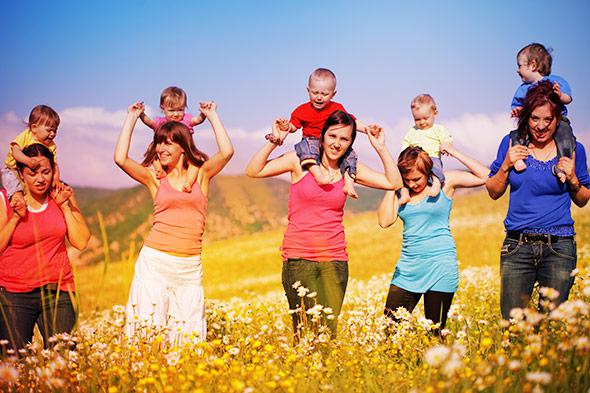Dear young parents: I know you’re scared and appalled and furious at all those people who did not vaccinate their kids. And I get it. But I want to tell you what it was like 26 years ago when I was having babies.
I was probably younger than you—21 years old—living in a liberal little flower burst of a university town. I joined the La Leche League and volunteered at the co-op wearing my son in a sling. There was this group of older, wiser women in hemp blouses and Birkenstocks. They had sweet-smelling homes full of herbs and tinctures; most of them were on kid four or five, their husbands at the university getting postdocs in marine biology or comparative religion. These women took me in, they schooled me in attachment parenting and the family bed, and they warned me about vaccines.
News was just circulating among the all-organic set that the shots were poison and no one I knew was letting their kids be immunized. No one. A few of the women whispered that they were relying on other people to immunize and keep the crowd safe. They understood the theory behind herd immunity. As we sat breastfeeding side by side, my favorite of the women told me that her beloved family doctor didn’t vaccinate his own children. Because most people did, he reasoned, there was no cause to put his kids through the discomfort and infinitesimal risk. Most people, he encouraged to give their kids the shots. But patients who were also friends—like her—he’d tell, she said.
Back then, the mothers I knew didn’t feel guilty about this. They seemed to feel … smart. Just as they fed their kids better food and provided more stimulating preschool activities than less-engaged moms, they employed every strategy they could to keep their families safe. I wanted to go along, but I couldn’t. It just didn’t feel right.
I immunized my children, sons born in 1988 and 1990, because I believed in my gut that it was the right thing to do. Then three years later, my older son started showing signs of autism. And those women who’d advised me early on? They were right there, watching, clucking. Several of them told me outright that I should have listened. Now I’d gone and damaged my child’s brain.
We moved to a larger city and had a third child not long after that. Most of the people I met vaccinated and fed their children boxed macaroni and cheese. But I spent a good 15 years feeling ashamed and responsible. Then Jenny McCarthy appeared, confirming all my worst fears. Anti-vax was out in the zeitgeist.
One by one, my friends and relatives would call to ask me if I thought the shots had caused my son’s autism. They wanted me to tell them if they should vaccinate their own kids. “I just don’t think I could handle a child with special needs,” they would say gently. (Which made me want to scream, every single time, because the implication was that this was a choice you made based on whether or not you could “handle” it. And I’ll tell you the truth: I hated them all.)
Some of them went ahead and vaccinated their kids when I told them honestly that I didn’t think the shots were linked to autism—that, in fact, I’d gone ahead and vaccinated my other kids. But many did not. And despite what I’d said—what I believed in steady, clear daylight hours—at night I was a mess of doubts and regret. I’d lie awake wondering what would have happened if I’d been as cautious and selfish as those other parents. Would my kid be “normal”? Would his life be easier. Had I, in my pride and arrogance insisted on doing what I thought was right at the expense of my child?
Autism has been a witch-hunt for centuries. Demons, refrigerator mothers, vaccines, gluten. These hysterias torture parents. They also marginalize the children themselves. During the years of vaccine fever, my son was seen as something monstrous, to be avoided, the result of damage—instead of the quiet, funny, often troubled person that he is. Our society’s drive to eliminate his kind, even if it meant bringing back diseases that kill, has had a dark, dehumanizing effect on his life. And that pursuit of the so-called perfect child that all my friends and sisters and cousins were engaged in? Well it sounds like a fable, but that’s where this new measles epidemic was born.
Sure, the autism-vaccine link has been debunked now. But as recently as when my son went through a nightmarish lost year of bad meds, catatonia, seizures, and anger, I was waking up at night, breathless, remembering the needle going into his arm and wondering if I’d just said “No,” could I have prevented it all? Anti-vax may sound insane to you. But damn, it was convincing then.
So while you’re puzzling over who could be so stupid as to do this despicable thing—opening the door to disease—consider my story. Survival is hard-wired and people do terrible, self-serving things to protect what’s theirs. Odds were excellent for an anti-vaxxer from the time I started having children until about 2010. The most educated parents I knew were questioning immunization. Ask yourself: If you’d been having babies back when measles and whooping cough seemed to be eliminated, what would you have done?
Read more of Slate’s vaccines coverage, including:
